Research Skills: Applying Social Cognitive Theory to Grand UK Holidays
VerifiedAdded on 2023/06/18
|7
|1846
|91
Report
AI Summary
This report examines the application of social cognitive theory to Grand UK Holidays, a tour company. It interprets the theory, focusing on personal, environmental, and behavioral factors, and how these impact the organization. The report discusses how Grand UK Holidays utilizes training and development to influence employee behavior positively, enhancing efficiency. It highlights the importance of observation, modeling, and imitation in learning, and addresses the effects of personal factors like moral development and changing policies on employee attitudes. Furthermore, it explores environmental factors such as social norms and community access, and behavioral factors like skills and self-efficacy. Recommendations include maintaining a positive working environment, providing motivation through performance management, training, and recognition. The report concludes that social cognitive theory is valuable for enhancing individual behavior and organizational performance. Desklib provides access to similar solved assignments and resources for students.
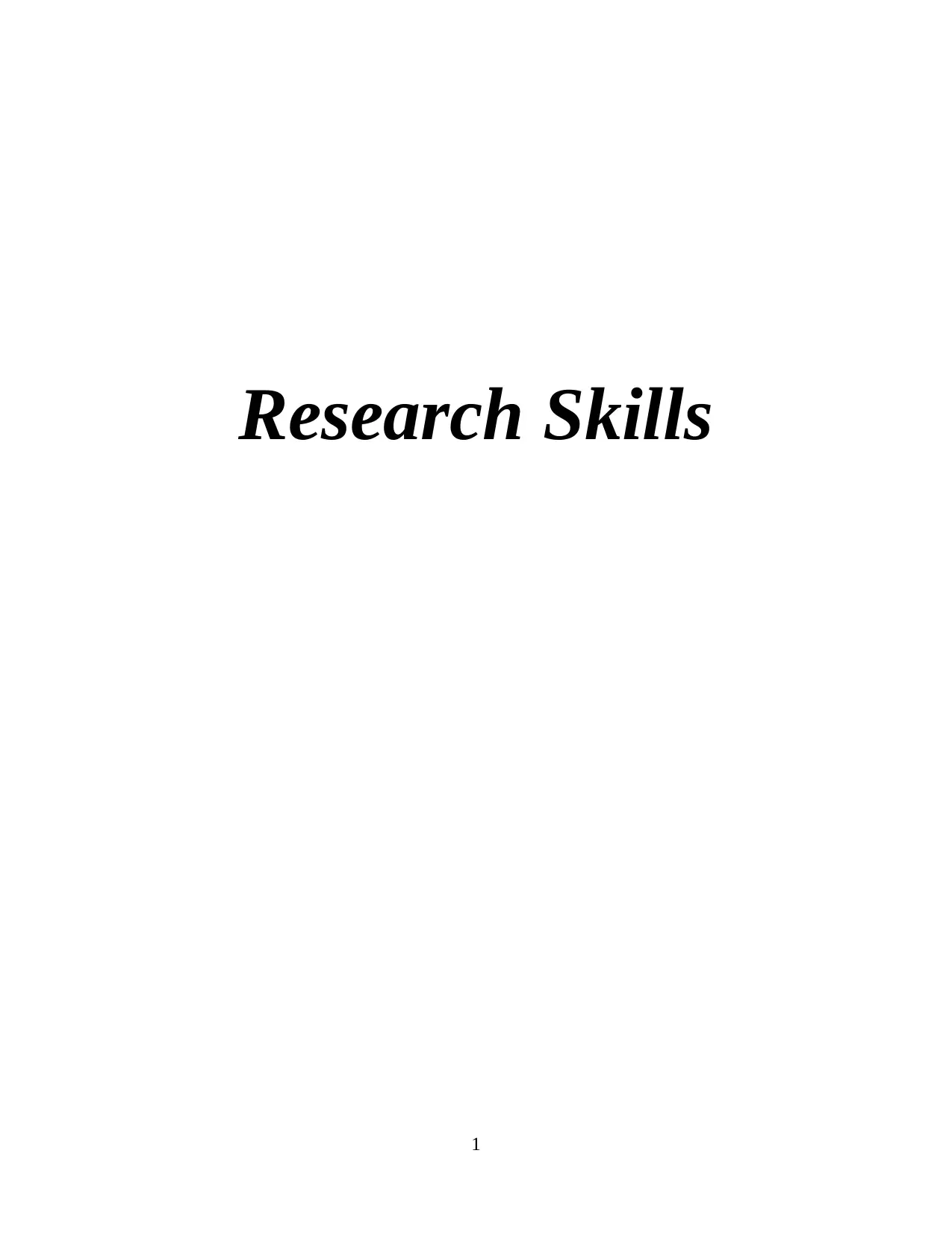
Research Skills
1
1
Paraphrase This Document
Need a fresh take? Get an instant paraphrase of this document with our AI Paraphraser
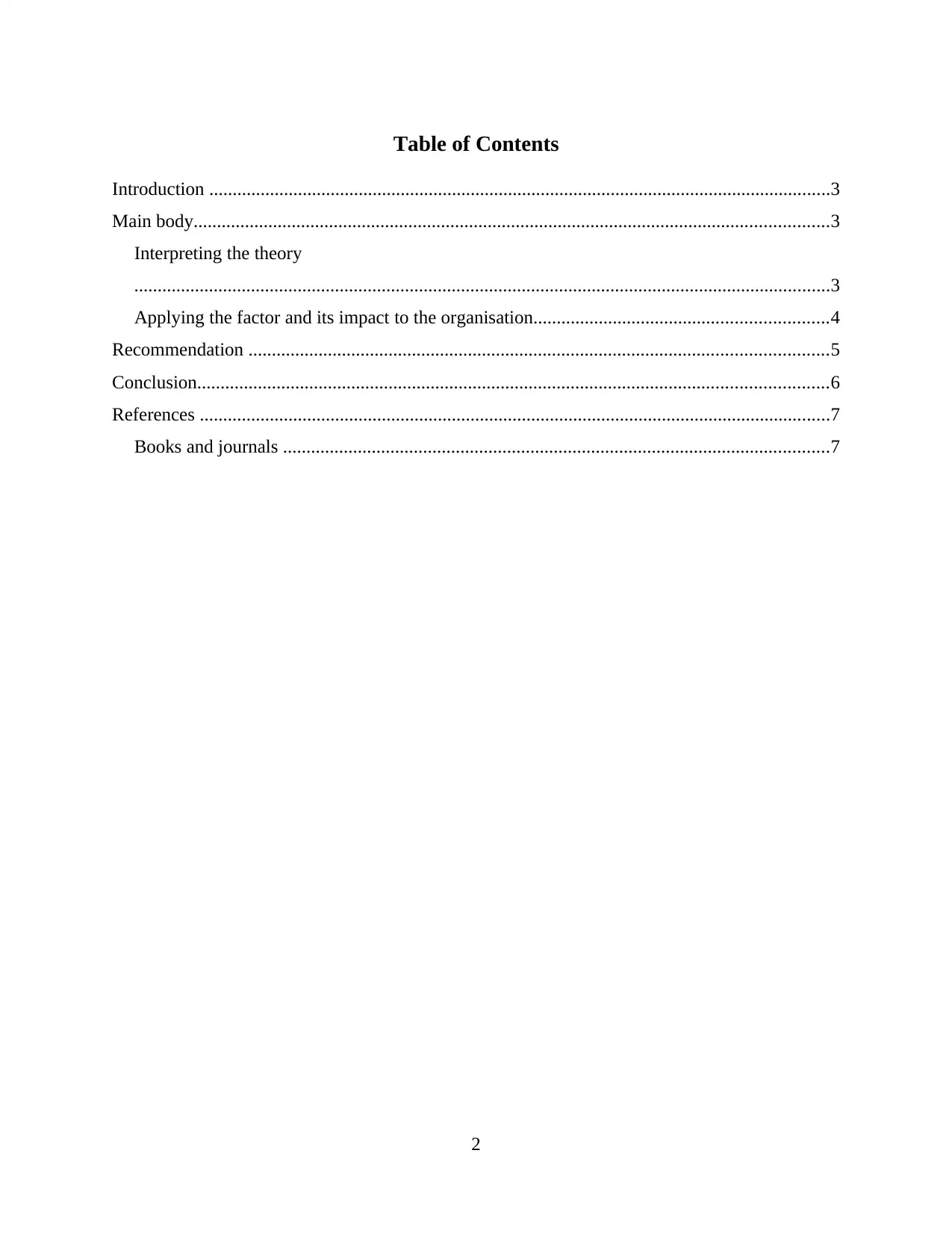
Table of Contents
Introduction .....................................................................................................................................3
Main body........................................................................................................................................3
Interpreting the theory
.....................................................................................................................................................3
Applying the factor and its impact to the organisation...............................................................4
Recommendation ............................................................................................................................5
Conclusion.......................................................................................................................................6
References .......................................................................................................................................7
Books and journals .....................................................................................................................7
2
Introduction .....................................................................................................................................3
Main body........................................................................................................................................3
Interpreting the theory
.....................................................................................................................................................3
Applying the factor and its impact to the organisation...............................................................4
Recommendation ............................................................................................................................5
Conclusion.......................................................................................................................................6
References .......................................................................................................................................7
Books and journals .....................................................................................................................7
2
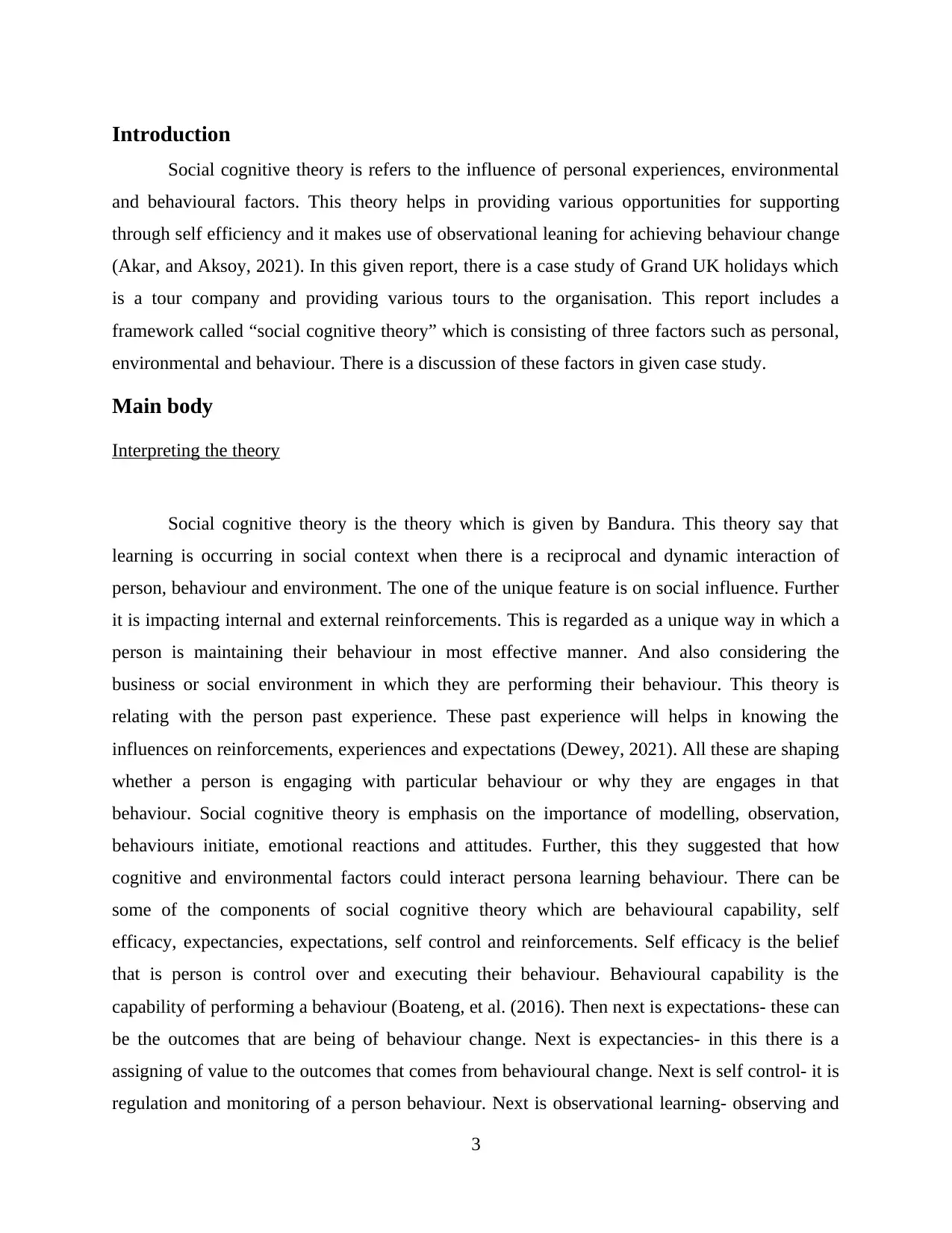
Introduction
Social cognitive theory is refers to the influence of personal experiences, environmental
and behavioural factors. This theory helps in providing various opportunities for supporting
through self efficiency and it makes use of observational leaning for achieving behaviour change
(Akar, and Aksoy, 2021). In this given report, there is a case study of Grand UK holidays which
is a tour company and providing various tours to the organisation. This report includes a
framework called “social cognitive theory” which is consisting of three factors such as personal,
environmental and behaviour. There is a discussion of these factors in given case study.
Main body
Interpreting the theory
Social cognitive theory is the theory which is given by Bandura. This theory say that
learning is occurring in social context when there is a reciprocal and dynamic interaction of
person, behaviour and environment. The one of the unique feature is on social influence. Further
it is impacting internal and external reinforcements. This is regarded as a unique way in which a
person is maintaining their behaviour in most effective manner. And also considering the
business or social environment in which they are performing their behaviour. This theory is
relating with the person past experience. These past experience will helps in knowing the
influences on reinforcements, experiences and expectations (Dewey, 2021). All these are shaping
whether a person is engaging with particular behaviour or why they are engages in that
behaviour. Social cognitive theory is emphasis on the importance of modelling, observation,
behaviours initiate, emotional reactions and attitudes. Further, this they suggested that how
cognitive and environmental factors could interact persona learning behaviour. There can be
some of the components of social cognitive theory which are behavioural capability, self
efficacy, expectancies, expectations, self control and reinforcements. Self efficacy is the belief
that is person is control over and executing their behaviour. Behavioural capability is the
capability of performing a behaviour (Boateng, et al. (2016). Then next is expectations- these can
be the outcomes that are being of behaviour change. Next is expectancies- in this there is a
assigning of value to the outcomes that comes from behavioural change. Next is self control- it is
regulation and monitoring of a person behaviour. Next is observational learning- observing and
3
Social cognitive theory is refers to the influence of personal experiences, environmental
and behavioural factors. This theory helps in providing various opportunities for supporting
through self efficiency and it makes use of observational leaning for achieving behaviour change
(Akar, and Aksoy, 2021). In this given report, there is a case study of Grand UK holidays which
is a tour company and providing various tours to the organisation. This report includes a
framework called “social cognitive theory” which is consisting of three factors such as personal,
environmental and behaviour. There is a discussion of these factors in given case study.
Main body
Interpreting the theory
Social cognitive theory is the theory which is given by Bandura. This theory say that
learning is occurring in social context when there is a reciprocal and dynamic interaction of
person, behaviour and environment. The one of the unique feature is on social influence. Further
it is impacting internal and external reinforcements. This is regarded as a unique way in which a
person is maintaining their behaviour in most effective manner. And also considering the
business or social environment in which they are performing their behaviour. This theory is
relating with the person past experience. These past experience will helps in knowing the
influences on reinforcements, experiences and expectations (Dewey, 2021). All these are shaping
whether a person is engaging with particular behaviour or why they are engages in that
behaviour. Social cognitive theory is emphasis on the importance of modelling, observation,
behaviours initiate, emotional reactions and attitudes. Further, this they suggested that how
cognitive and environmental factors could interact persona learning behaviour. There can be
some of the components of social cognitive theory which are behavioural capability, self
efficacy, expectancies, expectations, self control and reinforcements. Self efficacy is the belief
that is person is control over and executing their behaviour. Behavioural capability is the
capability of performing a behaviour (Boateng, et al. (2016). Then next is expectations- these can
be the outcomes that are being of behaviour change. Next is expectancies- in this there is a
assigning of value to the outcomes that comes from behavioural change. Next is self control- it is
regulation and monitoring of a person behaviour. Next is observational learning- observing and
3
⊘ This is a preview!⊘
Do you want full access?
Subscribe today to unlock all pages.

Trusted by 1+ million students worldwide
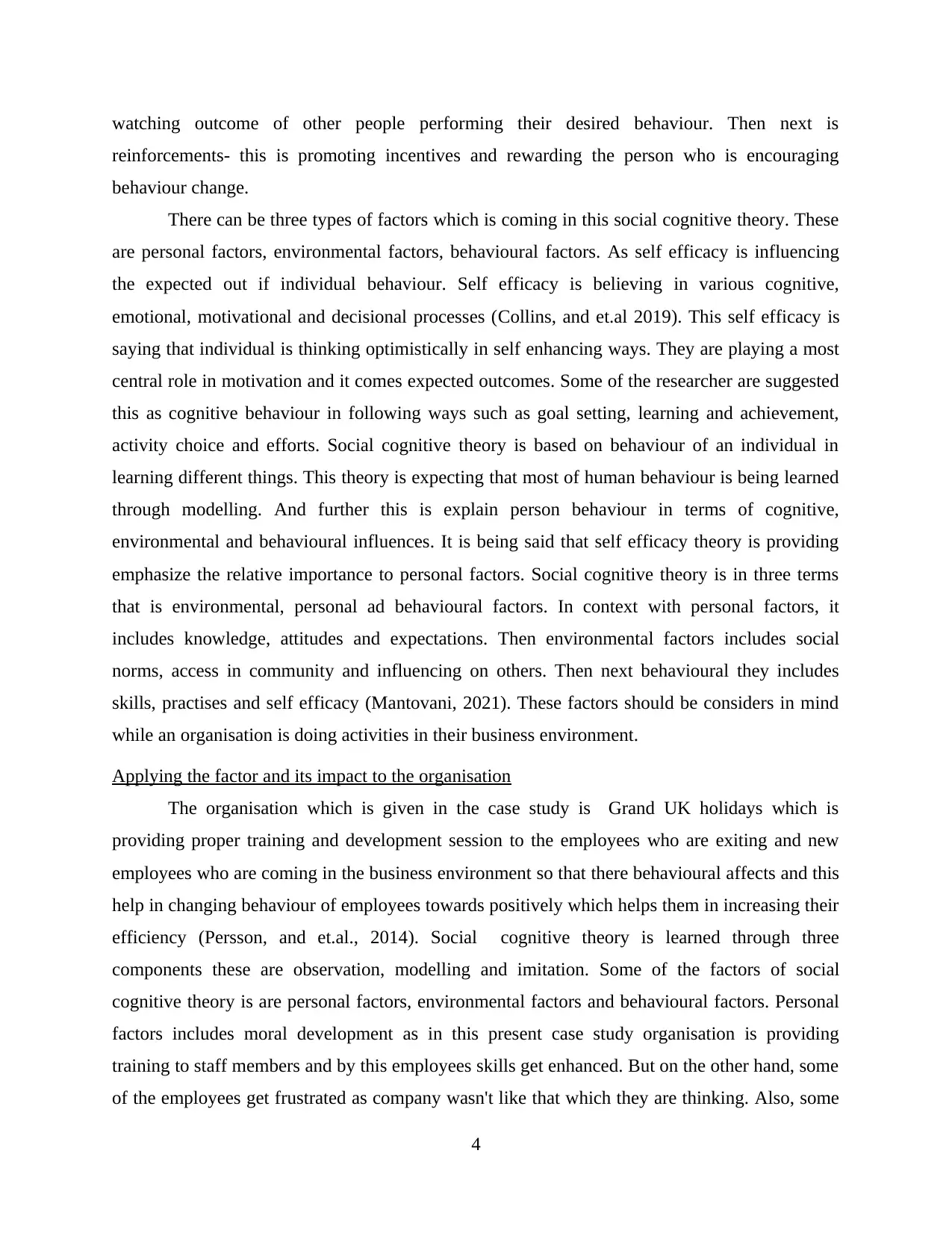
watching outcome of other people performing their desired behaviour. Then next is
reinforcements- this is promoting incentives and rewarding the person who is encouraging
behaviour change.
There can be three types of factors which is coming in this social cognitive theory. These
are personal factors, environmental factors, behavioural factors. As self efficacy is influencing
the expected out if individual behaviour. Self efficacy is believing in various cognitive,
emotional, motivational and decisional processes (Collins, and et.al 2019). This self efficacy is
saying that individual is thinking optimistically in self enhancing ways. They are playing a most
central role in motivation and it comes expected outcomes. Some of the researcher are suggested
this as cognitive behaviour in following ways such as goal setting, learning and achievement,
activity choice and efforts. Social cognitive theory is based on behaviour of an individual in
learning different things. This theory is expecting that most of human behaviour is being learned
through modelling. And further this is explain person behaviour in terms of cognitive,
environmental and behavioural influences. It is being said that self efficacy theory is providing
emphasize the relative importance to personal factors. Social cognitive theory is in three terms
that is environmental, personal ad behavioural factors. In context with personal factors, it
includes knowledge, attitudes and expectations. Then environmental factors includes social
norms, access in community and influencing on others. Then next behavioural they includes
skills, practises and self efficacy (Mantovani, 2021). These factors should be considers in mind
while an organisation is doing activities in their business environment.
Applying the factor and its impact to the organisation
The organisation which is given in the case study is Grand UK holidays which is
providing proper training and development session to the employees who are exiting and new
employees who are coming in the business environment so that there behavioural affects and this
help in changing behaviour of employees towards positively which helps them in increasing their
efficiency (Persson, and et.al., 2014). Social cognitive theory is learned through three
components these are observation, modelling and imitation. Some of the factors of social
cognitive theory is are personal factors, environmental factors and behavioural factors. Personal
factors includes moral development as in this present case study organisation is providing
training to staff members and by this employees skills get enhanced. But on the other hand, some
of the employees get frustrated as company wasn't like that which they are thinking. Also, some
4
reinforcements- this is promoting incentives and rewarding the person who is encouraging
behaviour change.
There can be three types of factors which is coming in this social cognitive theory. These
are personal factors, environmental factors, behavioural factors. As self efficacy is influencing
the expected out if individual behaviour. Self efficacy is believing in various cognitive,
emotional, motivational and decisional processes (Collins, and et.al 2019). This self efficacy is
saying that individual is thinking optimistically in self enhancing ways. They are playing a most
central role in motivation and it comes expected outcomes. Some of the researcher are suggested
this as cognitive behaviour in following ways such as goal setting, learning and achievement,
activity choice and efforts. Social cognitive theory is based on behaviour of an individual in
learning different things. This theory is expecting that most of human behaviour is being learned
through modelling. And further this is explain person behaviour in terms of cognitive,
environmental and behavioural influences. It is being said that self efficacy theory is providing
emphasize the relative importance to personal factors. Social cognitive theory is in three terms
that is environmental, personal ad behavioural factors. In context with personal factors, it
includes knowledge, attitudes and expectations. Then environmental factors includes social
norms, access in community and influencing on others. Then next behavioural they includes
skills, practises and self efficacy (Mantovani, 2021). These factors should be considers in mind
while an organisation is doing activities in their business environment.
Applying the factor and its impact to the organisation
The organisation which is given in the case study is Grand UK holidays which is
providing proper training and development session to the employees who are exiting and new
employees who are coming in the business environment so that there behavioural affects and this
help in changing behaviour of employees towards positively which helps them in increasing their
efficiency (Persson, and et.al., 2014). Social cognitive theory is learned through three
components these are observation, modelling and imitation. Some of the factors of social
cognitive theory is are personal factors, environmental factors and behavioural factors. Personal
factors includes moral development as in this present case study organisation is providing
training to staff members and by this employees skills get enhanced. But on the other hand, some
of the employees get frustrated as company wasn't like that which they are thinking. Also, some
4
Paraphrase This Document
Need a fresh take? Get an instant paraphrase of this document with our AI Paraphraser
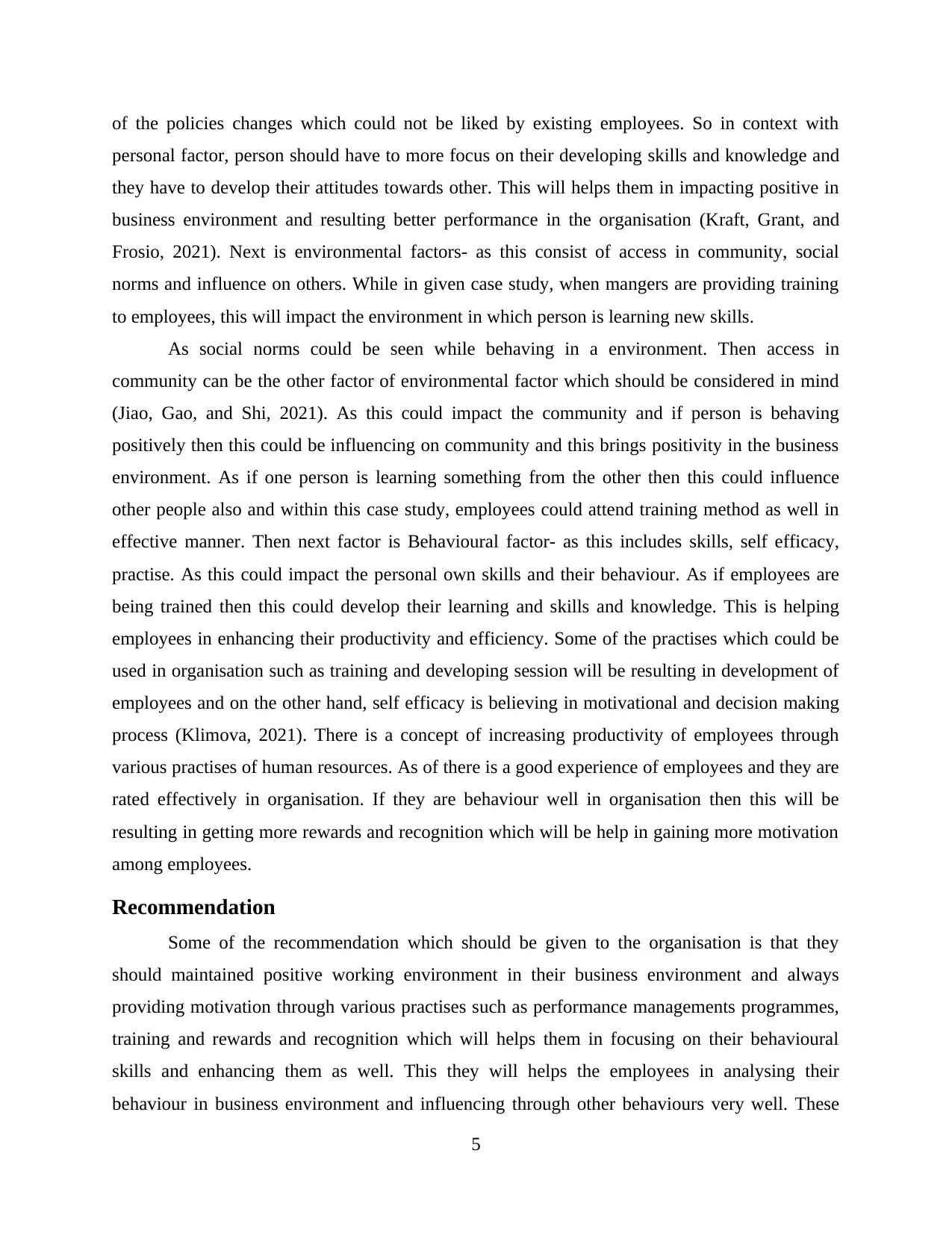
of the policies changes which could not be liked by existing employees. So in context with
personal factor, person should have to more focus on their developing skills and knowledge and
they have to develop their attitudes towards other. This will helps them in impacting positive in
business environment and resulting better performance in the organisation (Kraft, Grant, and
Frosio, 2021). Next is environmental factors- as this consist of access in community, social
norms and influence on others. While in given case study, when mangers are providing training
to employees, this will impact the environment in which person is learning new skills.
As social norms could be seen while behaving in a environment. Then access in
community can be the other factor of environmental factor which should be considered in mind
(Jiao, Gao, and Shi, 2021). As this could impact the community and if person is behaving
positively then this could be influencing on community and this brings positivity in the business
environment. As if one person is learning something from the other then this could influence
other people also and within this case study, employees could attend training method as well in
effective manner. Then next factor is Behavioural factor- as this includes skills, self efficacy,
practise. As this could impact the personal own skills and their behaviour. As if employees are
being trained then this could develop their learning and skills and knowledge. This is helping
employees in enhancing their productivity and efficiency. Some of the practises which could be
used in organisation such as training and developing session will be resulting in development of
employees and on the other hand, self efficacy is believing in motivational and decision making
process (Klimova, 2021). There is a concept of increasing productivity of employees through
various practises of human resources. As of there is a good experience of employees and they are
rated effectively in organisation. If they are behaviour well in organisation then this will be
resulting in getting more rewards and recognition which will be help in gaining more motivation
among employees.
Recommendation
Some of the recommendation which should be given to the organisation is that they
should maintained positive working environment in their business environment and always
providing motivation through various practises such as performance managements programmes,
training and rewards and recognition which will helps them in focusing on their behavioural
skills and enhancing them as well. This they will helps the employees in analysing their
behaviour in business environment and influencing through other behaviours very well. These
5
personal factor, person should have to more focus on their developing skills and knowledge and
they have to develop their attitudes towards other. This will helps them in impacting positive in
business environment and resulting better performance in the organisation (Kraft, Grant, and
Frosio, 2021). Next is environmental factors- as this consist of access in community, social
norms and influence on others. While in given case study, when mangers are providing training
to employees, this will impact the environment in which person is learning new skills.
As social norms could be seen while behaving in a environment. Then access in
community can be the other factor of environmental factor which should be considered in mind
(Jiao, Gao, and Shi, 2021). As this could impact the community and if person is behaving
positively then this could be influencing on community and this brings positivity in the business
environment. As if one person is learning something from the other then this could influence
other people also and within this case study, employees could attend training method as well in
effective manner. Then next factor is Behavioural factor- as this includes skills, self efficacy,
practise. As this could impact the personal own skills and their behaviour. As if employees are
being trained then this could develop their learning and skills and knowledge. This is helping
employees in enhancing their productivity and efficiency. Some of the practises which could be
used in organisation such as training and developing session will be resulting in development of
employees and on the other hand, self efficacy is believing in motivational and decision making
process (Klimova, 2021). There is a concept of increasing productivity of employees through
various practises of human resources. As of there is a good experience of employees and they are
rated effectively in organisation. If they are behaviour well in organisation then this will be
resulting in getting more rewards and recognition which will be help in gaining more motivation
among employees.
Recommendation
Some of the recommendation which should be given to the organisation is that they
should maintained positive working environment in their business environment and always
providing motivation through various practises such as performance managements programmes,
training and rewards and recognition which will helps them in focusing on their behavioural
skills and enhancing them as well. This they will helps the employees in analysing their
behaviour in business environment and influencing through other behaviours very well. These
5
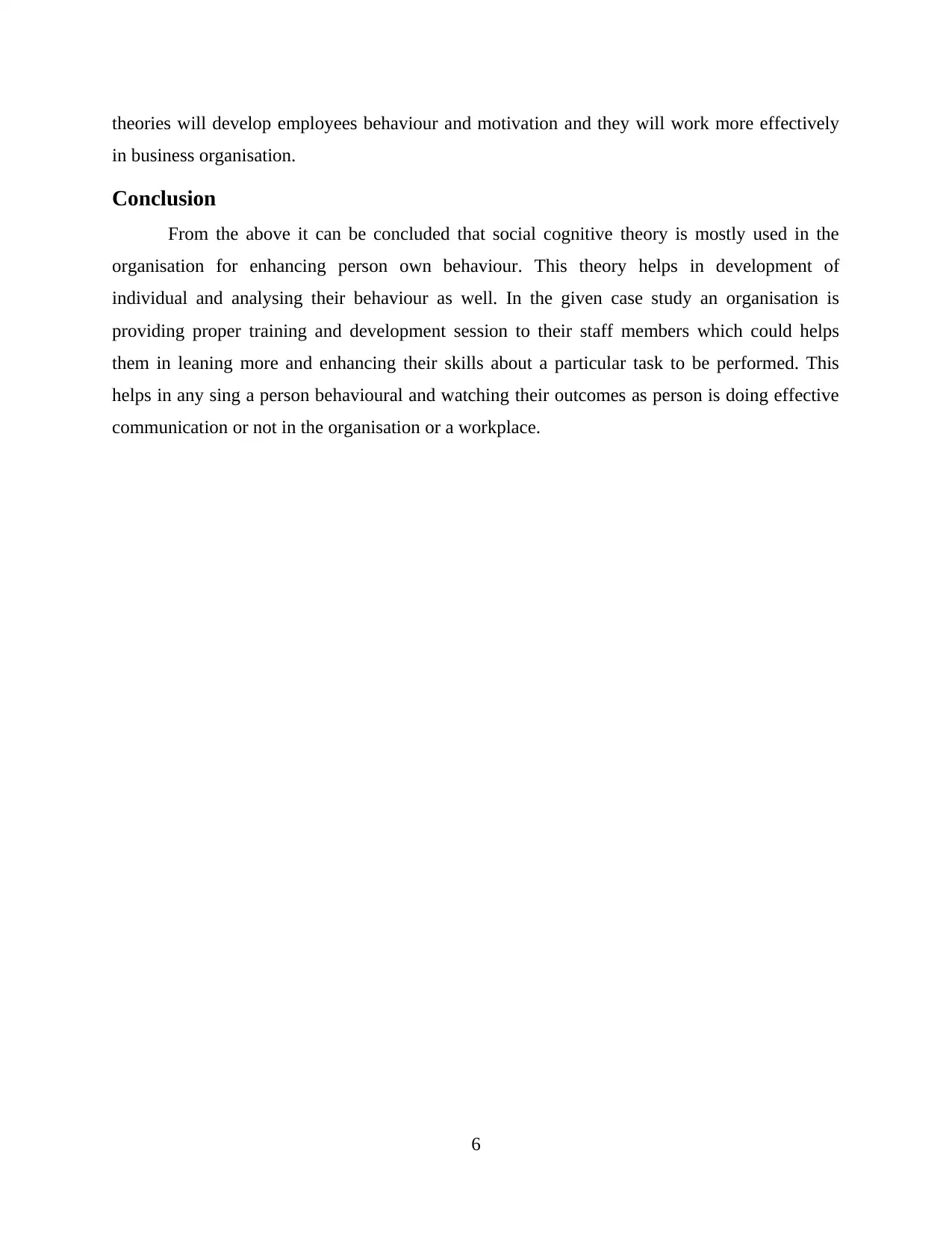
theories will develop employees behaviour and motivation and they will work more effectively
in business organisation.
Conclusion
From the above it can be concluded that social cognitive theory is mostly used in the
organisation for enhancing person own behaviour. This theory helps in development of
individual and analysing their behaviour as well. In the given case study an organisation is
providing proper training and development session to their staff members which could helps
them in leaning more and enhancing their skills about a particular task to be performed. This
helps in any sing a person behavioural and watching their outcomes as person is doing effective
communication or not in the organisation or a workplace.
6
in business organisation.
Conclusion
From the above it can be concluded that social cognitive theory is mostly used in the
organisation for enhancing person own behaviour. This theory helps in development of
individual and analysing their behaviour as well. In the given case study an organisation is
providing proper training and development session to their staff members which could helps
them in leaning more and enhancing their skills about a particular task to be performed. This
helps in any sing a person behavioural and watching their outcomes as person is doing effective
communication or not in the organisation or a workplace.
6
⊘ This is a preview!⊘
Do you want full access?
Subscribe today to unlock all pages.

Trusted by 1+ million students worldwide
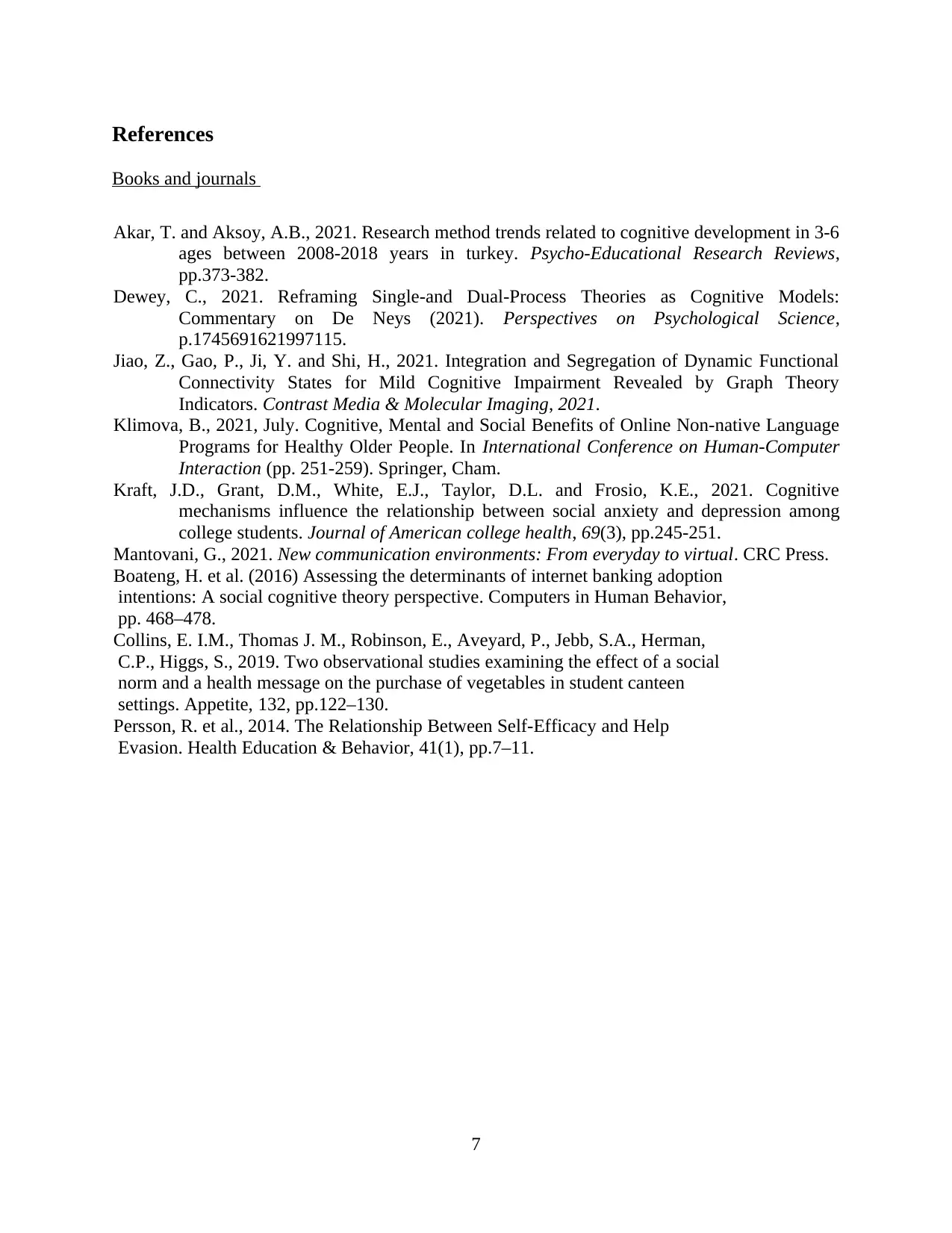
References
Books and journals
Akar, T. and Aksoy, A.B., 2021. Research method trends related to cognitive development in 3-6
ages between 2008-2018 years in turkey. Psycho-Educational Research Reviews,
pp.373-382.
Dewey, C., 2021. Reframing Single-and Dual-Process Theories as Cognitive Models:
Commentary on De Neys (2021). Perspectives on Psychological Science,
p.1745691621997115.
Jiao, Z., Gao, P., Ji, Y. and Shi, H., 2021. Integration and Segregation of Dynamic Functional
Connectivity States for Mild Cognitive Impairment Revealed by Graph Theory
Indicators. Contrast Media & Molecular Imaging, 2021.
Klimova, B., 2021, July. Cognitive, Mental and Social Benefits of Online Non-native Language
Programs for Healthy Older People. In International Conference on Human-Computer
Interaction (pp. 251-259). Springer, Cham.
Kraft, J.D., Grant, D.M., White, E.J., Taylor, D.L. and Frosio, K.E., 2021. Cognitive
mechanisms influence the relationship between social anxiety and depression among
college students. Journal of American college health, 69(3), pp.245-251.
Mantovani, G., 2021. New communication environments: From everyday to virtual. CRC Press.
Boateng, H. et al. (2016) Assessing the determinants of internet banking adoption
intentions: A social cognitive theory perspective. Computers in Human Behavior,
pp. 468–478.
Collins, E. I.M., Thomas J. M., Robinson, E., Aveyard, P., Jebb, S.A., Herman,
C.P., Higgs, S., 2019. Two observational studies examining the effect of a social
norm and a health message on the purchase of vegetables in student canteen
settings. Appetite, 132, pp.122–130.
Persson, R. et al., 2014. The Relationship Between Self-Efficacy and Help
Evasion. Health Education & Behavior, 41(1), pp.7–11.
7
Books and journals
Akar, T. and Aksoy, A.B., 2021. Research method trends related to cognitive development in 3-6
ages between 2008-2018 years in turkey. Psycho-Educational Research Reviews,
pp.373-382.
Dewey, C., 2021. Reframing Single-and Dual-Process Theories as Cognitive Models:
Commentary on De Neys (2021). Perspectives on Psychological Science,
p.1745691621997115.
Jiao, Z., Gao, P., Ji, Y. and Shi, H., 2021. Integration and Segregation of Dynamic Functional
Connectivity States for Mild Cognitive Impairment Revealed by Graph Theory
Indicators. Contrast Media & Molecular Imaging, 2021.
Klimova, B., 2021, July. Cognitive, Mental and Social Benefits of Online Non-native Language
Programs for Healthy Older People. In International Conference on Human-Computer
Interaction (pp. 251-259). Springer, Cham.
Kraft, J.D., Grant, D.M., White, E.J., Taylor, D.L. and Frosio, K.E., 2021. Cognitive
mechanisms influence the relationship between social anxiety and depression among
college students. Journal of American college health, 69(3), pp.245-251.
Mantovani, G., 2021. New communication environments: From everyday to virtual. CRC Press.
Boateng, H. et al. (2016) Assessing the determinants of internet banking adoption
intentions: A social cognitive theory perspective. Computers in Human Behavior,
pp. 468–478.
Collins, E. I.M., Thomas J. M., Robinson, E., Aveyard, P., Jebb, S.A., Herman,
C.P., Higgs, S., 2019. Two observational studies examining the effect of a social
norm and a health message on the purchase of vegetables in student canteen
settings. Appetite, 132, pp.122–130.
Persson, R. et al., 2014. The Relationship Between Self-Efficacy and Help
Evasion. Health Education & Behavior, 41(1), pp.7–11.
7
1 out of 7
Related Documents
Your All-in-One AI-Powered Toolkit for Academic Success.
+13062052269
info@desklib.com
Available 24*7 on WhatsApp / Email
![[object Object]](/_next/static/media/star-bottom.7253800d.svg)
Unlock your academic potential
Copyright © 2020–2025 A2Z Services. All Rights Reserved. Developed and managed by ZUCOL.





